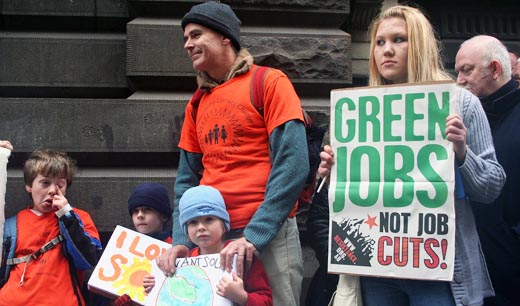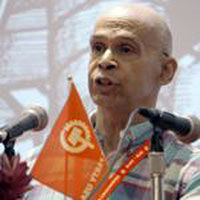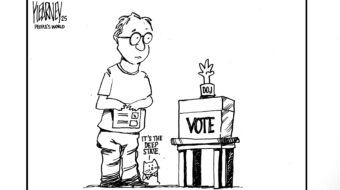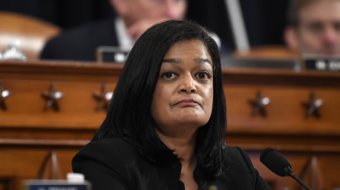
The failure to enact a big enough economic stimulus in the early days of the Obama administration is perhaps the single biggest reason the country’s in the mess it’s in.
While the American Recovery and Reinvestment Act certainly helped ward off the worst effects of the crisis, official unemployment still rose to over 10 percent. Feeding on the resulting anger and disillusionment and adding an additional dash of racism, the GOP/tea party nightriders rode to victory in last fall’s mid-term elections.
Sensible voices from the left and center, including the president himself, sought a larger spending package. The labor movement pushed for it, and sympathetic academics and talking heads made impassioned appeals. “You’ll only get one shot at this,” warned Paul Krugman, Princeton’s liberal economist, time and again.
Powerful elements were opposed. After Wall Street and its corporate lobbyists called in their marks and the votes were counted, a smaller-than-envisioned stimulus was passed by Congress.
Was another alternative possible? Not according to former Obama advisor Larry Summers, recently interviewed by the New York Times Magazine.
Summers, who, ironically, helped during the Clinton years to implement policies that led to the crisis, argued that the Obama team supported a bigger stimulus package, but that the votes just weren’t there: “It was entirely clear in the meeting where this was discussed that a larger fiscal program would have larger multiplier effects. The constraints were political, and indeed the seriousness of those constraints is demonstrated by the fact that the ultimate bill that passed was between 70 and 80 percent as large as what the president sought.”
As Summers made clear, the president’s initial plan was headed straight into a right-wing Republican gale. And even though the Democrats held a congressional majority, a monolithic Republican minority along with conservative elements among the Democrats themselves doomed larger spending proposals. Indeed, in the months after the bill passed, a deaf ear was turned toward calls for a second stimulus, calls that largely came from the labor movement.
Thus, way before the tea-party-led landslide last November, in fact a full year before, in the midst of the crisis and at the very height of the new president’s popularity, the votes just weren’t there. The newly-elected Democratic majority, many of whom had narrowly won election in Republican districts, couldn’t muster the muscle.
The Obama coalition and the movement that led to his election were too young; the victory was too new and fragile. This could be seen much more clearly just two years later when many of these same Democratic freshmen, along with a number of veteran Blue Dogs, went down to defeat, some for voting for the stimulus in the first place.
What, then, are the prospects for the struggle for jobs after 2012? Even a centrist like Summers seems deeply concerned: “I worry for the medium and long term about where the jobs are going to come from for those with fewer skills,” he told the Times. Summers continued, “One in five men between 25 and 54 is not working, and a reasonable projection is that it will still be one in six after the economy recovers. It was one in 20 in the 1960s.”
Summers, perhaps, precludes a government-sponsored public works green jobs program repairing and renovating the nation’s infrastructure and providing valuable job training in new technologies. The Obama administration has stressed instead private sector initiatives focused on small businesses.
On the other hand, labor, community and civil rights groups clearly have not given up the idea of the need for the public sector to play a major role in job creation. Nor should they.
Clearly a precondition for moving forward along these lines is defeating the Republican majority in the House of Representatives and re-winning the presidency next year. In light of the blitzkrieg of anti-labor legislation this past winter and spring, state legislatures and governors’ mansions are exceedingly important contests as well.
While much will depend on the size of the hoped for victory, it is likely, as suggested above, that a simple Democratic win will not be enough.
For a meaningful jobs bill to pass in the next administration, the grassroots labor and community movement that is building across the country in response to the GOP attack on public workers will have to maintain its organizational strength and independence. It will surely have to fight like hell after the election for enactment of campaign promises.
How this is done is as important as the demand. Winning ever-wider sections of the people, including sections of the business community (particularly small and medium-size businesses) along with small towns and rural communities will be critical. Swing states and communities will be highly contested areas and even conservative areas cannot be written off. The working class and people as a whole are suffering from the crisis caused by the banking financiers.
It is worth recalling that in the battle over the Employee Free Choice Act, and the more recent attack on public workers, the president voiced support for labor and the right to organize. It would be a huge mistake to view this administration as an obstacle to progress on the jobs front.
In this regard, an eye toward unity when placing demands is an important consideration. As important is keeping focused on the far right and their corporate sponsors.
Only enormous public pressure will insure that a desperately needed public works green jobs program gets passed by the next Congress. Nothing less will stand a chance.
Photo: Takver // CC 2.0










